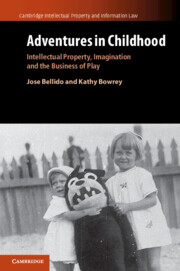Book contents
- Adventures in Childhood
- Cambridge Intellectual Property and Information Law
- Adventures in Childhood
- Copyright page
- Contents
- Figures
- Acknowledgements
- Abbreviations
- Introduction
- 1 Commercialisation and the Innocent Child
- 2 Books, Toy Books and the Artfulness of Consumption
- 3 Instructions for a Successful Boy
- 4 Animated Properties
- 5 Licensing Gone Wrong
- 6 The Rise of Merchandising Agencies
- 7 Troubles at the British Broadcasting Corporation
- Conclusion: Unsuitable for Children
- Index
- Cambridge Intellectual Property and Information Law
7 - Troubles at the British Broadcasting Corporation
Published online by Cambridge University Press: 30 June 2022
- Adventures in Childhood
- Cambridge Intellectual Property and Information Law
- Adventures in Childhood
- Copyright page
- Contents
- Figures
- Acknowledgements
- Abbreviations
- Introduction
- 1 Commercialisation and the Innocent Child
- 2 Books, Toy Books and the Artfulness of Consumption
- 3 Instructions for a Successful Boy
- 4 Animated Properties
- 5 Licensing Gone Wrong
- 6 The Rise of Merchandising Agencies
- 7 Troubles at the British Broadcasting Corporation
- Conclusion: Unsuitable for Children
- Index
- Cambridge Intellectual Property and Information Law
Summary
The tangled beginnings of the establishment of merchandising at the BBC are further developed in Chapter 7. The most troubling question for the corporation was how, in line with the organisation’s traditional public values and duties as expressed in its charter and broadcasting licence, it should respond to the exploitation of radio identities such as ‘Uncle Mac’, a persona linked to the radio star and BBC employee Derek McCulloch, that were, without authority, also being commercialised on everyday consumer goods by outsiders to the corporation. Internal dynamics at the BBC were further impacted by the development of commercial television and the unexpected success of television programmes such as Dr Who. As expectations shifted, rather than being criticised for commercialisation, it was the public corporation’s failure to pursue profit that became contentious. One outcome of this was the development of a new management unit separate from programming, the BBC Exploitation Department, later renamed as BBC Television Enterprises, which served as merchandising agent for third-party productions such as The Magic Roundabout and The Wombles. Both instances resulted in litigation.
Keywords
- Type
- Chapter
- Information
- Adventures in ChildhoodIntellectual Property, Imagination and the Business of Play, pp. 237 - 280Publisher: Cambridge University PressPrint publication year: 2022

